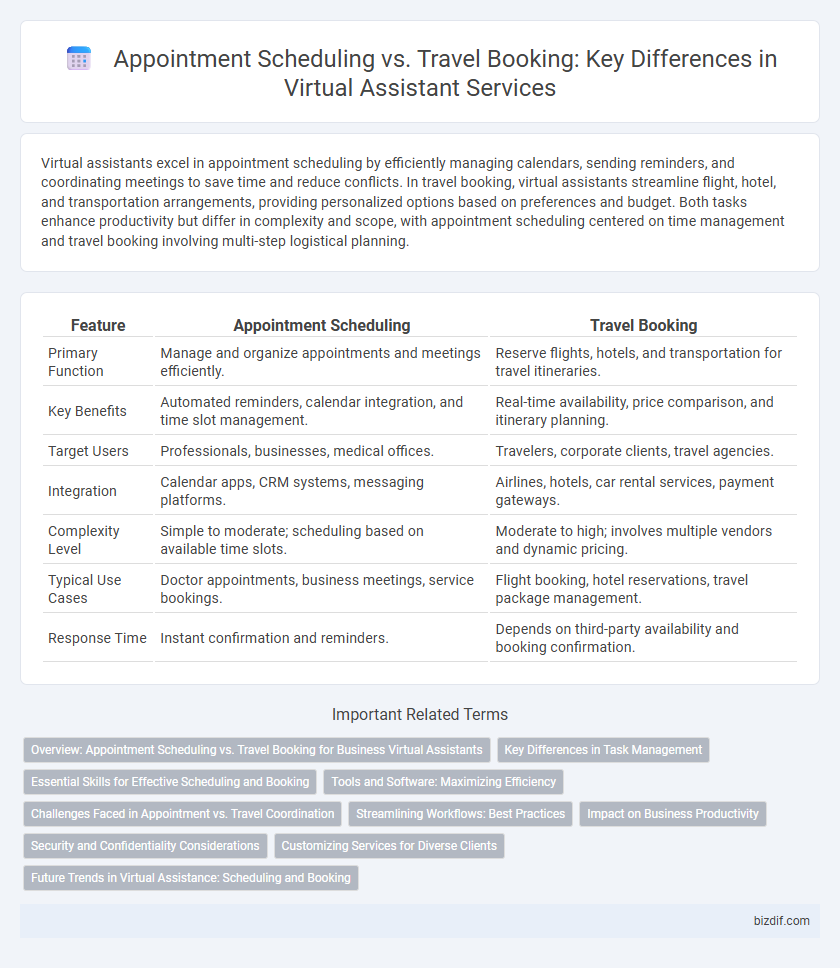Virtual assistants excel in appointment scheduling by efficiently managing calendars, sending reminders, and coordinating meetings to save time and reduce conflicts. In travel booking, virtual assistants streamline flight, hotel, and transportation arrangements, providing personalized options based on preferences and budget. Both tasks enhance productivity but differ in complexity and scope, with appointment scheduling centered on time management and travel booking involving multi-step logistical planning.
Table of Comparison
| Feature | Appointment Scheduling | Travel Booking |
|---|---|---|
| Primary Function | Manage and organize appointments and meetings efficiently. | Reserve flights, hotels, and transportation for travel itineraries. |
| Key Benefits | Automated reminders, calendar integration, and time slot management. | Real-time availability, price comparison, and itinerary planning. |
| Target Users | Professionals, businesses, medical offices. | Travelers, corporate clients, travel agencies. |
| Integration | Calendar apps, CRM systems, messaging platforms. | Airlines, hotels, car rental services, payment gateways. |
| Complexity Level | Simple to moderate; scheduling based on available time slots. | Moderate to high; involves multiple vendors and dynamic pricing. |
| Typical Use Cases | Doctor appointments, business meetings, service bookings. | Flight booking, hotel reservations, travel package management. |
| Response Time | Instant confirmation and reminders. | Depends on third-party availability and booking confirmation. |
Overview: Appointment Scheduling vs. Travel Booking for Business Virtual Assistants
Business virtual assistants excel in appointment scheduling by managing calendars, sending reminders, and coordinating meetings to enhance productivity and time management. Travel booking requires handling flight reservations, hotel accommodations, and itinerary planning, demanding attention to detail and familiarity with travel policies. Efficient virtual assistants tailor their approach based on client needs, leveraging technology to optimize both scheduling and travel arrangements.
Key Differences in Task Management
Appointment scheduling primarily involves managing time-specific tasks, coordinating calendars, and sending reminders to ensure timely engagements. Travel booking requires handling multiple components such as flights, accommodations, and transportation, often involving complex itineraries and real-time changes. The key difference lies in appointment scheduling focusing on precise timing for meetings, while travel booking demands comprehensive coordination of diverse logistics.
Essential Skills for Effective Scheduling and Booking
Effective appointment scheduling requires strong organizational skills, attention to detail, and clear communication to manage calendars and avoid conflicts. Travel booking demands proficiency in research, negotiation, and familiarity with booking platforms to secure optimal flights and accommodations. Both tasks benefit from time management expertise and the ability to handle last-minute changes efficiently.
Tools and Software: Maximizing Efficiency
Appointment scheduling tools like Calendly and Acuity streamline client bookings by automating time slot availability and reminders, reducing no-shows and manual coordination. Travel booking software such as TripIt and Expensify consolidates itineraries, manages expenses, and integrates with calendars to simplify trip planning and expense tracking. Leveraging specialized virtual assistant platforms enhances efficiency by centralizing appointment and travel management through AI-powered automation.
Challenges Faced in Appointment vs. Travel Coordination
Appointment scheduling often requires handling last-minute changes and coordinating multiple participants' availability, which can lead to complex conflict resolution challenges. Travel booking involves managing dynamic factors such as fluctuating prices, diverse transportation options, and real-time itinerary adjustments that demand advanced integration with various service providers. Both processes require not only precise time management but also seamless communication to ensure user satisfaction and minimize disruptions.
Streamlining Workflows: Best Practices
Virtual assistants enhance streamlining workflows by automating appointment scheduling through calendar integration and real-time availability updates, reducing manual errors. In travel booking, leveraging AI-driven tools to compare flight options and handle itinerary changes optimizes time management and resource allocation. Implementing a unified platform that synchronizes appointments and travel plans ensures seamless coordination and improved productivity.
Impact on Business Productivity
Appointment scheduling streamlines client interactions by automating calendar management, reducing no-shows, and minimizing administrative tasks, directly boosting business efficiency. Travel booking handled by virtual assistants optimizes employee time, cuts costs through better itinerary management, and ensures seamless logistics coordination. Both functions enhance productivity, but appointment scheduling delivers immediate time savings for client-facing operations, while travel booking supports broader organizational efficiency.
Security and Confidentiality Considerations
Appointment scheduling systems prioritize strict data encryption and access controls to protect personal information such as names, contact details, and appointment times from unauthorized access. Travel booking platforms implement enhanced security protocols, including secure payment gateways and compliance with international data protection regulations like GDPR, to safeguard sensitive financial and identification data during transactions. Both services necessitate vigilant monitoring and continuous updates to address evolving cybersecurity threats and ensure user confidentiality.
Customizing Services for Diverse Clients
Virtual assistants excel in customizing services by tailoring appointment scheduling to meet specific client preferences and time zones, ensuring seamless coordination across multiple calendars. In travel booking, they optimize itineraries by integrating personalized preferences such as budget, accommodation type, and activity interests, enhancing the overall travel experience. This adaptability in handling diverse client needs highlights the efficiency and flexibility of virtual assistants in delivering tailored solutions.
Future Trends in Virtual Assistance: Scheduling and Booking
Future trends in virtual assistance reveal an increasing integration of AI-driven appointment scheduling and travel booking systems, enabling seamless multitasking and personalized user experiences. Advanced natural language processing and predictive analytics allow virtual assistants to anticipate user needs and optimize time management effectively. Enhanced interoperability with calendars, booking platforms, and real-time updates will further streamline scheduling and travel arrangements for users worldwide.
Appointment scheduling vs Travel booking Infographic

 bizdif.com
bizdif.com